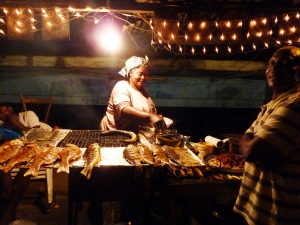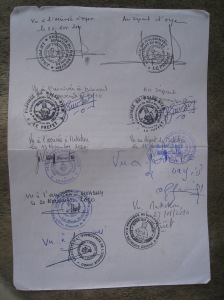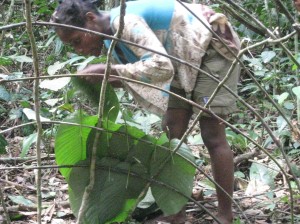The one thing Baka love more than anything else is a good party. The Baka word ‘be’ translates as dance, but in Baka means both song and dance – they make no distinction between the two. I have been enjoying many nights dancing with them, and listening to their traditional polyphonic songs, sometimes getting up in the middle of the night when I was awoken by polyphonic sounds. This type of singing is unique to Central Africa, and polyphonic really means that every individual sings their own tune. At first this sounded rather disjointed to me, but then I understood the underlying harmony, and joined in to the best of my abilities. To start a Baka dance, the men are called upon to drum, and the women to sing. If either of these isn’t to the others satisfaction, no dance takes place.

A traditional Baka party: Men drumming (here sitting and standing in front of women) and women singing (here standing behing men)
There are many different types of Baka dance, depending on the event. Whilst I was in the field, one of the old women died. Nowadays, the Baka bury their dead, holding all-night vigils before and after the burial. The haunting quality of these songs specific to a Baka death rite is something I will never forget.
Parents constantly try to protect their babies and children from evil spells and illnesses through pastes, ointments or special foods made from plant materials, from leaves and barks. During a funeral rite children are perceived to be particularly vunerable and were being protected in many different ways. The one I found most powerful was rinsing babies and the very small children with a brew made from different leaves and some kind of maggot slush, over the new grave, right after the burial.
The Edzengui dance is central to Baka rites. Edzengui is a powerful forest spirit, and when he comes to dance, he is dressed in raphia leaves, and must be guided by male initiates. Women are scared of him and his male power, and must not come into contact with him. Edzengui floats over the ground and dances by circling, sometimes for hours without end.
Baka also have great fun watching music videos. In Nà Pòte, a non-Baka trader recently built a wooden house with generator, and now plays dance videos at any time of day. Baka adolescents are no different from anywhere else in the world, and they love to watch these music videos and imitate the dance moves they see; especially the young men try to be even more cool than the hard guys they see on screen. Often their younger siblings and older relatives join in and it soon becomes one of the many impromptu village parties.
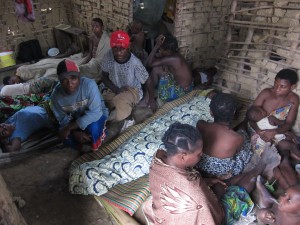
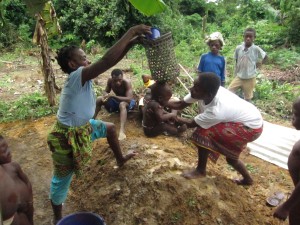





 Posted by doerte106
Posted by doerte106 







